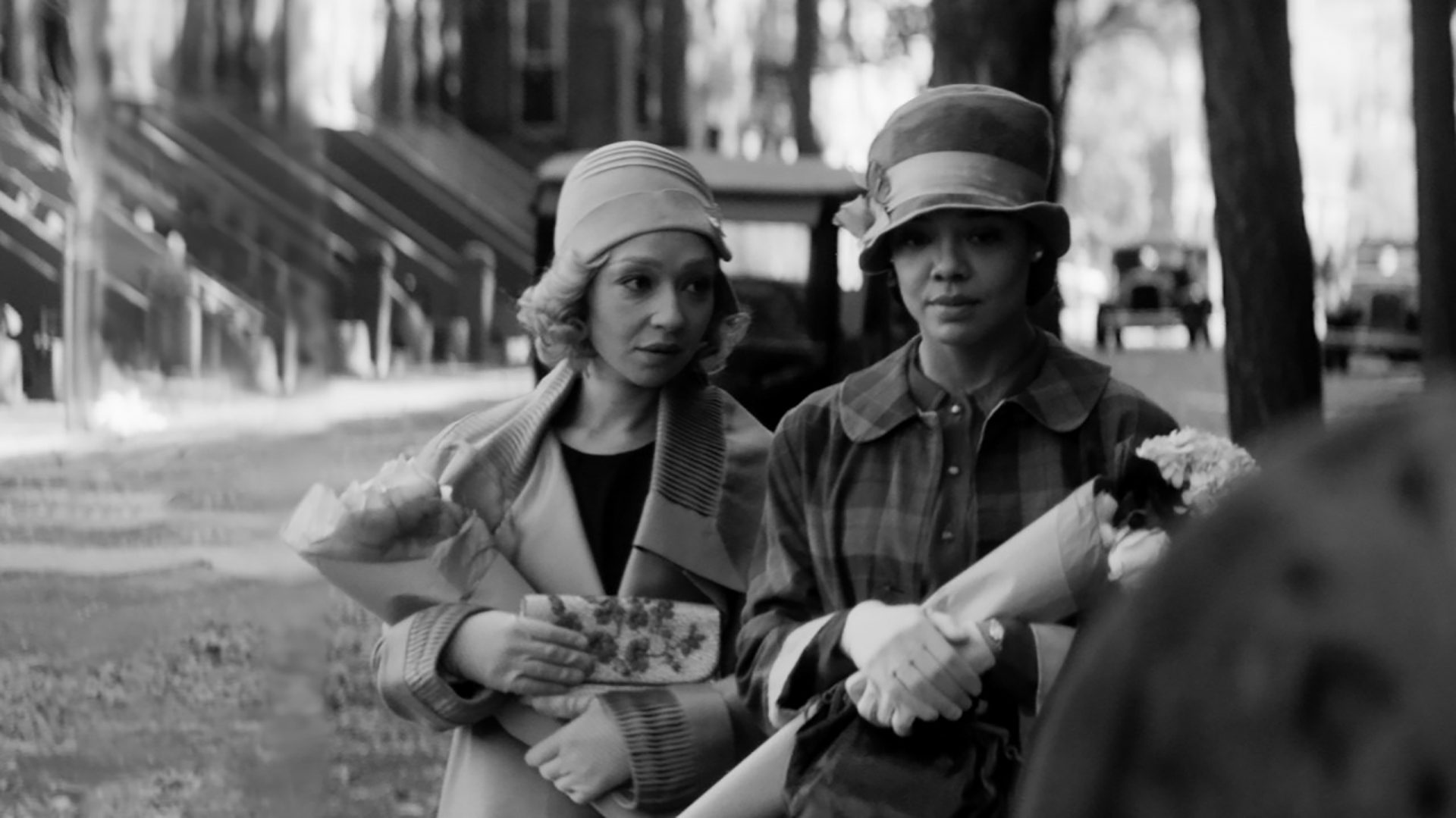Rebecca Hall has been delivering notably clever performances as an actor for a long time. The daughter of an opera singer and a theatre and film director, her first role was played at age 10.
She had a breakthrough part in the 2008 Woody Allen film Vicky Cristina Barcelona (Hall later apologised for appearing in it, after allegations of sexual abuse by Allen resurfaced, and donated her fee to the Time’s Up campaign). Perhaps her most lauded performance was as Christine Chubbuk, an American newscaster who took her own life on air, in the 2016 film Christine. This felt like a turning point of sorts for Hall, forcefully shelving any lingering reductive perception of her as a privileged English Rose beauty without much to say for herself.
Now she has turned the characteristic intelligence of her acting work to directing, and has created a film the equal of any she has performed in, and far more powerful than most of them.
Passing is an adaptation of a novel by the same name published in 1929 by Nella Larsen. It’s a seductive, sumptuous thing, shot in black and white and punctuated regularly by the same melancholy jazz piano theme (written by Dev Hynes), part of a spare but extremely effective soundscape.
Set in segregation-era Harlem, it sees the rekindling of an old friendship between two women, both of whom set off something repressed and gravely significant in the other. The stakes of their renewed intimacy heighten inexorably, until every moment feels imbued by anxious tension, and the moments of beauty and pleasure we have seen thus far feel now cast in a very different light by the inevitability which hangs over the doomed friendship.
Irene (Tessa Thompson) is a middle-class-by-marriage lightskinned Black woman raising two sons with her doctor husband Brian (André Holland). She keeps a beautiful home with the help of a housekeeper at whom she snaps jarringly (the housekeeper is a darker-skinned Black woman).
On a hot day, Irene makes the one-off decision to “pass” as white to gain entrance to a Whites Only hotel for a drink and some reprieve. While there she is astonished to meet a childhood friend, Clare (Ruth Negga). Clare, another light-skinned Black woman, has dyed her hair blonde and has successfully been passing as white for many years. She is married to John (Alexander Skarsgård), who suspects nothing.
Irene is instantly wary of Clare. We sense that Clare held some special meaning for her in childhood, and that her reappearance is disturbing. As the film progresses, we might infer that this special meaning was a kind of desire – whether this was an overt sexual desire or envy or resentment toward her beauty is not explicit, though repressed queerness is suggested fairly openly.
Clare takes Irene to her suite to introduce her husband. John quickly transpires to be violently and casually racist, laughing as he fires off racial slurs, Irene trying not to cringe too obviously, she herself also passing as white in his presence.
We get a brief foreshadowing of what Clare’s deception costs her, as John declares himself less fearful of Black people than his wife, who will not even hire them as maids. We, and Irene, know of course that her inability to be around other Black people is not due to hatred but instead terror of being identified as her true self.
In this moment, the fragility of Clare’s extreme beauty and charisma is clear – we can see the toll of incessantly internalising what she knows to be a lie day in day out. The chance meeting sparks something in Clare. She is urgently desperate to be around people of colour again, and ingratiates herself into Irene’s household and lifestyle with forceful abandon. There is something distasteful and untoward about her simpering admiration of Brian, Irene’s husband. Or is there?
Clare’s exuberant energy and flattering enthusiasm for this other, Black life she could have known is so apparent and readily expressed that her affection for Brian could be innocent, part and parcel of her excavated passion for dancing, laughing, speaking with people of the sort she grew up around. Nevertheless, a seed of doubt has been sewn in Irene’s heart.
She has spent her adult life prioritising safety, temperance, a steady and sustainable way of living, even if its drought causes its own pain and discomfort. Clare’s shimmering existence explodes Irene’s ability to live in this way. Her appearance is a kind of mirage, a dazzling item of proof that one is capable of shaping perception and events with words and will alone.
The exposition of the fact that speaking something can bring it materially into existence is shocking. Clare shows Irene that what currently is must not always be, that one can define reality, and the potency of this revelation undoes them both.
This would be an easier narrative if Irene was shown to be stridently, authentically herself in such a way that it cast Clare’s choice to deny her Blackness as insane.
But instead, she is just as adrift, just as unsure of her identity, and in many ways more peripheral in her own life than Clare is. “We’re all passing for something, aren’t we?” Irene asks a friend, a white man fascinated by Clare’s deception.
This line, while a decent summation of the film’s central thesis, rings a little on the nose, and is one of a handful of such moments. It is so stylish and stylised a work that this feels almost unavoidable. Thompson’s performance, though often wonderful, is conjuring specifically 1920s intonations and coquettish mannerisms and as a result can feel too caricatured.
This is a small quibble, ultimately, and Negga’s brittle vulnerability and deflective glamour are a consistent triumph.
Passing poses some larger and perennially relevant cultural questions about the material realities of what we call race, and what makes someone “really” Black or “really” white, but what makes it so particularly good is that it’s also a much smaller story than that.
It’s the story of two women whose very different pretences and fantasies can’t allow them to co-exist. It’s the story of women watching each other, women wanting each other and women destroying each other.
Passing is streaming now on Netflix and is screening in limited cinemas.




